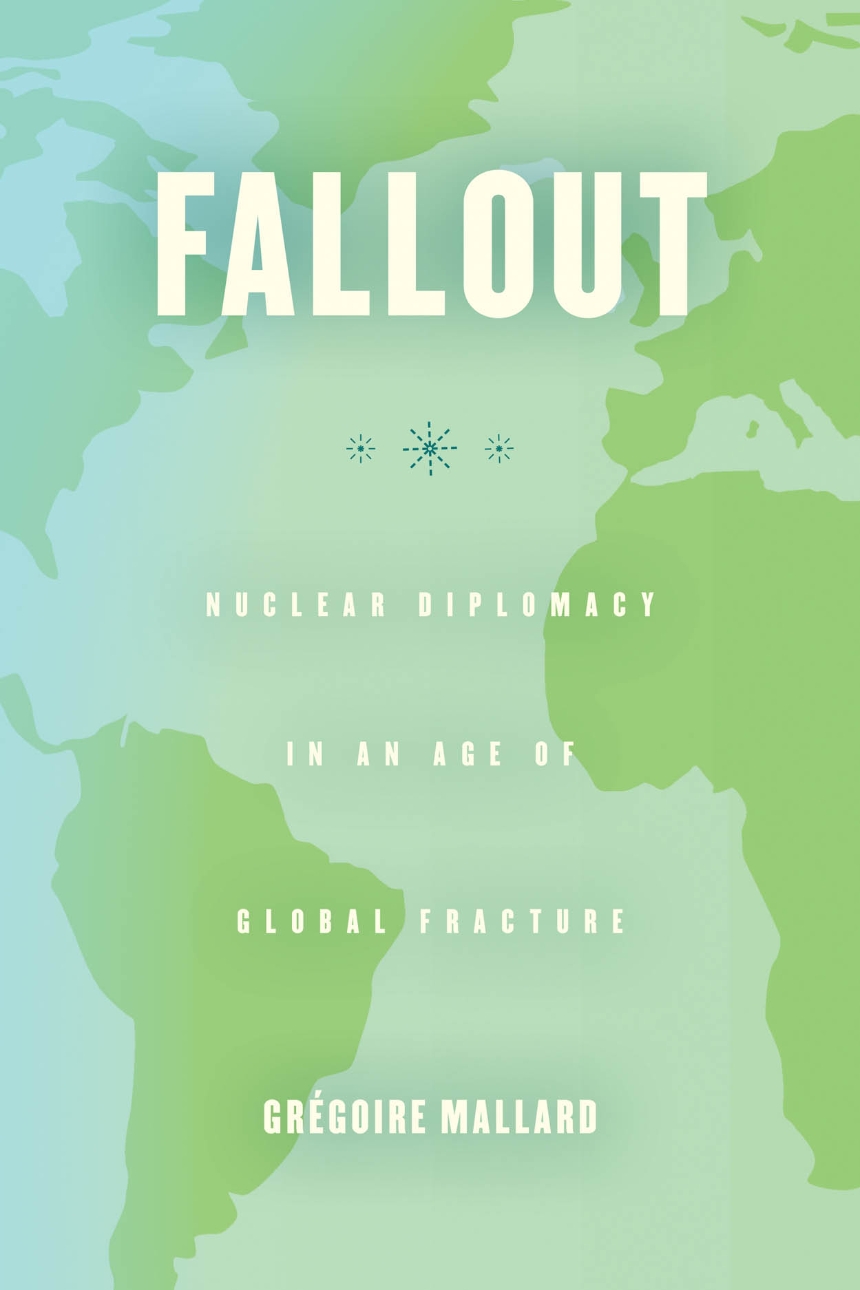Fallout
Nuclear Diplomacy in an Age of Global Fracture
Many Baby Boomers still recall crouching under their grade-school desks in frequent bomb drills during the Cuban Missile Crisis—a clear representation of how terrified the United States was of nuclear war. Thus far, we have succeeded in preventing such catastrophe, and this is partly due to the various treaties signed in the 1960s forswearing the use of nuclear technology for military purposes.
In Fallout, Grégoire Mallard seeks to understand why some nations agreed to these limitations of their sovereign will—and why others decidedly did not. He builds his investigation around the 1968 signing of the Nuclear Nonproliferation Treaty (NPT), which, though binding in nature, wasn’t adhered to consistently by all signatory nations. Mallard looks at Europe’s observance of treaty rules in contrast to the three holdouts in the global nonproliferation regime: Israel, India, and Pakistan. He seeks to find reasons for these discrepancies, and makes the compelling case that who wrote the treaty and how the rules were written—whether transparently, ambiguously, or opaquely—had major significance in how the rules were interpreted and whether they were then followed or dismissed as regimes changed. In honing in on this important piece of the story, Mallard not only provides a new perspective on our diplomatic history, but, more significantly, draws important conclusions about potential conditions that could facilitate the inclusion of the remaining NPT holdouts. Fallout is an important and timely book sure to be of interest to policy makers, activists, and concerned citizens alike.
In Fallout, Grégoire Mallard seeks to understand why some nations agreed to these limitations of their sovereign will—and why others decidedly did not. He builds his investigation around the 1968 signing of the Nuclear Nonproliferation Treaty (NPT), which, though binding in nature, wasn’t adhered to consistently by all signatory nations. Mallard looks at Europe’s observance of treaty rules in contrast to the three holdouts in the global nonproliferation regime: Israel, India, and Pakistan. He seeks to find reasons for these discrepancies, and makes the compelling case that who wrote the treaty and how the rules were written—whether transparently, ambiguously, or opaquely—had major significance in how the rules were interpreted and whether they were then followed or dismissed as regimes changed. In honing in on this important piece of the story, Mallard not only provides a new perspective on our diplomatic history, but, more significantly, draws important conclusions about potential conditions that could facilitate the inclusion of the remaining NPT holdouts. Fallout is an important and timely book sure to be of interest to policy makers, activists, and concerned citizens alike.
384 pages | 2 halftones, 16 line drawings, 12 tables | 6 x 9 | © 2014
Language and Linguistics: Language and Law
Law and Legal Studies: International Law
Political Science: Diplomacy, Foreign Policy, and International Relations
Sociology: Individual, State and Society
Reviews
Table of Contents
Acknowledgments
Abbreviations
Chapter 1: Introduction
Chapter 2: Explaining Recursive Cycles of Treaty Interpretation: The Role of Transparency, Ambiguity, and Opacity
Chapter 3: Secrecy and Transparency in the Early Nuclear Age: How They Both Failed World Federalists
Chapter 4: Ambiguity and Preemptive Interpretation: How Legal Indeterminacy Failed the Eurofederalists
Chapter 5: Opacity in Legal Interpretation: The Transatlantic Negotiations of the Euratom Treaty
Chapter 6: The Price of Opacity: How New Leaders Clarify Opaque Treaty Rules
Chapter 7: The Resilience of Opacity in a Changing International Legal Environment: How Europe Weighted East-West Negotiations of the NPT
Chapter 8: The Singular Legacies of Nuclear Opacity: The Difficult Road toward the Universalization of the NPT Regime
Notes
Bibliography
Index
Abbreviations
Chapter 1: Introduction
Chapter 2: Explaining Recursive Cycles of Treaty Interpretation: The Role of Transparency, Ambiguity, and Opacity
Chapter 3: Secrecy and Transparency in the Early Nuclear Age: How They Both Failed World Federalists
Chapter 4: Ambiguity and Preemptive Interpretation: How Legal Indeterminacy Failed the Eurofederalists
Chapter 5: Opacity in Legal Interpretation: The Transatlantic Negotiations of the Euratom Treaty
Chapter 6: The Price of Opacity: How New Leaders Clarify Opaque Treaty Rules
Chapter 7: The Resilience of Opacity in a Changing International Legal Environment: How Europe Weighted East-West Negotiations of the NPT
Chapter 8: The Singular Legacies of Nuclear Opacity: The Difficult Road toward the Universalization of the NPT Regime
Notes
Bibliography
Index
